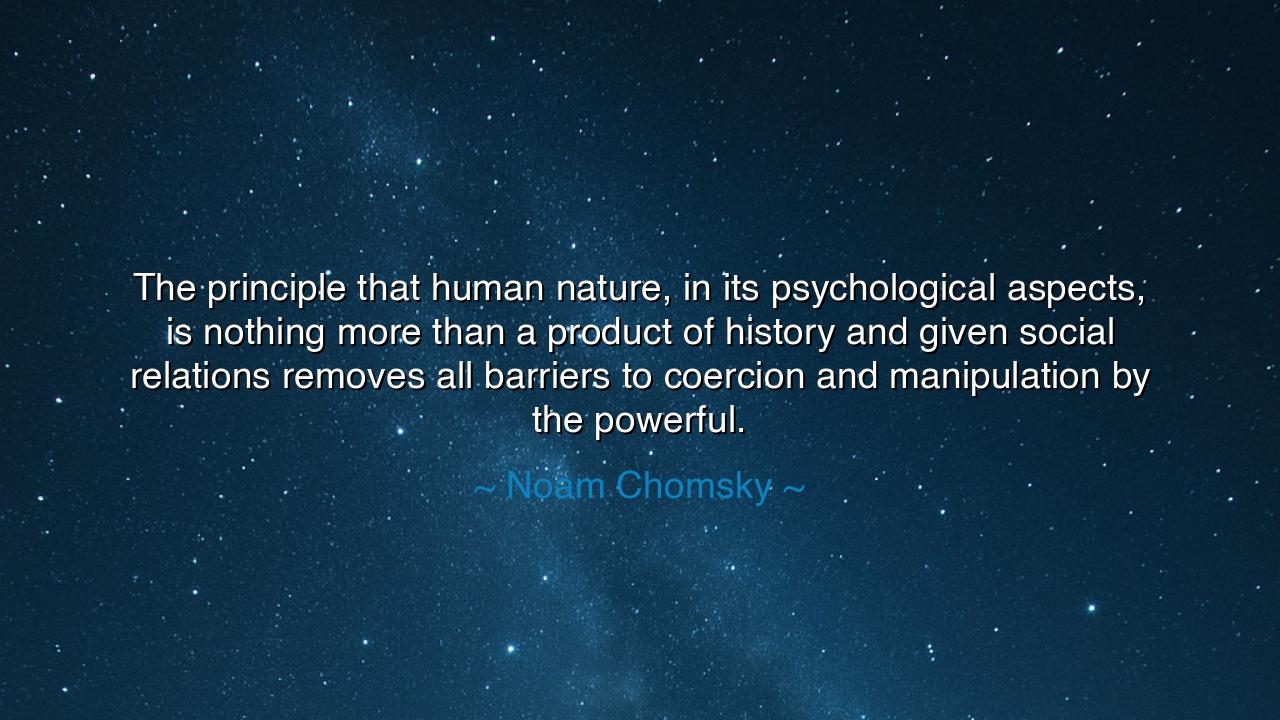
The principle that human nature, in its psychological aspects, is
The principle that human nature, in its psychological aspects, is nothing more than a product of history and given social relations removes all barriers to coercion and manipulation by the powerful.






“The principle that human nature, in its psychological aspects, is nothing more than a product of history and given social relations removes all barriers to coercion and manipulation by the powerful.” – Noam Chomsky
In these fierce and luminous words, Noam Chomsky, philosopher of reason and sentinel of truth, warns against one of the gravest deceptions of the modern age — the belief that human nature is merely a creation of history, that we are nothing more than the product of circumstance, custom, and power. To think so, he says, is to surrender the very essence of what makes us human. For if there is no enduring spirit within us — no conscience, no natural yearning for justice and freedom — then we become clay in the hands of those who rule. This idea, cloaked in intellectual pride, becomes a weapon: if human beings have no fixed nature, then they may be shaped endlessly by those who claim to know what is best.
Chomsky, in his wisdom, speaks as one who has seen the machinery of manipulation rise in the halls of politics, propaganda, and corporate power. He warns that if we deny the existence of any inborn sense of morality or reason — if we say that all thought, desire, and value are merely the shadows cast by our environment — then we erase the last defense against tyranny. For what prevents the powerful from molding minds, if minds are but wax? What restrains the ruler from bending men and women into tools, if their souls have no natural shape of their own? When we forget that there is a moral core in every human being, we open the gates to domination that reaches not only our bodies, but our minds themselves.
This is no abstract fear; history itself has lived this truth. Consider the empire of Joseph Stalin, who claimed that man was infinitely malleable — that through ideology, through conditioning, through terror, he could sculpt a new humanity. Under that belief, millions perished, families were torn apart, truth was rewritten, and even thought itself was treated as a crime. The state became the potter, the people the clay. To deny an inner human essence, as Chomsky warns, is to allow totalitarianism to flourish, for it gives the despot license to redefine what it means to be human. And once that definition belongs to the powerful, freedom ceases to exist.
Yet Chomsky’s words are not only a lament — they are a call to remembrance. He reminds us that within every soul burns something older than empire, deeper than politics, untouched by history: the innate dignity of human nature. This is the foundation upon which all true liberty stands. The philosophers of the Enlightenment, and before them the sages of Greece and the prophets of the East, all taught that there is within man a natural light — reason, conscience, and compassion — that no tyrant can extinguish. The moment we deny this light, we surrender the moral universe itself.
The ancients, too, understood this danger. In the legend of Prometheus, the gods punished the Titan for giving fire — symbol of knowledge and freedom — to humanity. For power fears nothing more than the awakening of the human spirit. But Prometheus endured his chains, because he knew that man’s nature was not that of a slave, but of a creator. Chomsky’s warning carries this same timeless flame: that we must protect our inner freedom, for it is the source of all outer liberation. The chains of the modern age are not forged of iron, but of persuasion, ideology, and control over thought.
In the world of today, where messages and meanings flow ceaselessly through screens and words, the struggle for the human soul has become invisible but no less real. Those who command wealth, technology, and media have learned to shape not only what we see, but what we believe we are. If we accept that we are only products of circumstance, we will live as products to be bought, sold, and steered. But if we remember that we possess reason, will, and conscience that no power can manufacture, then we reclaim our right to think freely — and therefore, to live freely.
So, my child of the future, let this be your understanding: you are not merely a creature of history. You are history’s author. You are not only the echo of your environment, but its shaper. Hold fast to the knowledge that within you lies a nature that no ruler, no system, no lie can fully command. Defend your mind as you would defend your homeland. Question those who seek to define what it means to be human. Think, speak, and act from the truth within you — for that truth is your shield against coercion and manipulation by the powerful.
And remember always, as Chomsky teaches, that freedom does not begin in the world — it begins in the soul that refuses to be molded.






AAdministratorAdministrator
Welcome, honored guests. Please leave a comment, we will respond soon